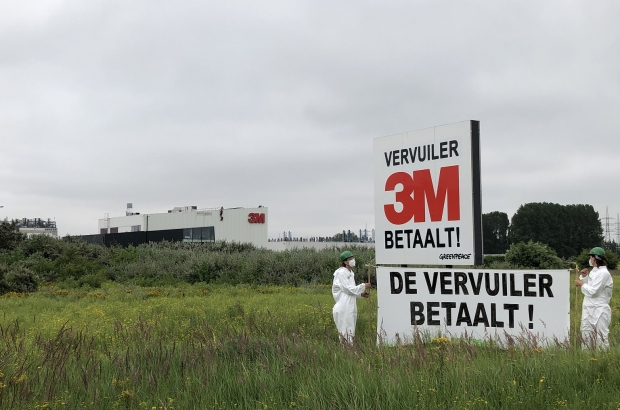- Daily & Weekly newsletters
- Buy & download The Bulletin
- Comment on our articles
Belgian family successfully sues 3M for pollution
An important precedent has been set in the Belgian court system following the victory of an individual family over the giant multinational cooperation 3M in regards to pollution.
In what is being referred to as a "David and Goliath" court case, a family with high levels of PFOS in their blood successfully sued the American company, RTBF reports.
3M has been embroiled in a pollution scandal for years after it was discovered that their activities in the Zwijndrecht factory in Antwerp resulted in significant PFOS pollution.
PFOS, which stands for perfluorooctane sulfonic acid, is one of a group of related chemicals known as PFAS (perfluorinated alkylated substances). Used in a wide range of industrial processes, the chemicals pose significant health risks when present in certain amounts.
Researchers and officials are still determining the degree to which 3M’s pollution spread, with the contaminated area growing as new information is obtained. Residents of a wide swath of Antwerp have already been instructed to cease eating eggs or vegetables grown in their gardens, as the PFOS contamination is present in soil.
Some of the earliest signs of pollution came from works done in the area, which turned up heavily polluted soil.
For the family involved in the court case, the levels of PFOS in their blood are well above what is considered to be the limit, and their house lost value because of the pollution.
A justice of the peace in Antwerp convicted 3M for “abnormal neighbourhood disturbances”.
“It’s interesting [to go to the justice of the peace] because it is not necessary to prove that 3M was negligent, it’s not a question of proving fault,” said Charles-Hubert Born, a professor at UCLouvain specialising in environmental law.
“It’s sufficient to prove that there was an abnormal, excessive neighbourhood disturbance and to prove a causal link between the activities carried out by the owner (3M) and the disturbance suffered by the neighbour (the family).”
Such a link was easy to prove in the case of 3M, said Born: “The pollution from the 3M factory in the Zwijndrecht area has been extensively studied and documented by the Flemish government and a parliamentary committee.”
The disturbance was similarly easy to prove via blood tests that showed abnormally high levels of PFOS in the family.
This legal method is also faster than a possible criminal procedure.
3M was ordered to pay a mere €2,000 to the family, which barely constitutes pocket change for the massive company, which reported an operating cash flow of $1.3 billion this quarter.
But the amount of damages paid could increase if further damage is caused, and the family’s goal was primarily to pave the way for future litigation for others in the area who have suffered health risks and a decline in the value of their homes as a result of the corporation’s pollution.
“We always thought that if we won, many others would follow our example,” the family’s lawyer Geert Lenssens told De Standaard. “Now the door is open.”
Charles-Hubert Born agreed this is a possibility. There is already a collective of affected residents called Darkwater 3M, named after the famous film about a small family of Americans who successfully sued a mega corporation for similar reasons.
“It is certain that this decision will create a stir and therefore perhaps encourage all households living around the factory to bring an action before the competent justice of the peace themselves,” Born said.
“If this contamination has indeed gone as far as Antwerp, we're talking about tens of thousands of households that could be affected, so it's an interesting question from a legal point of view, but this wasn't addressed by the judge.”
The court case could also affect other companies.
“It could indeed concern other companies, but you still have to prove contamination in the vicinity, which is not necessarily the case for all companies that produce PFOS,” said Born.
3M can still appeal, but if the decision is upheld, it will solidify itself as a precedent.


















